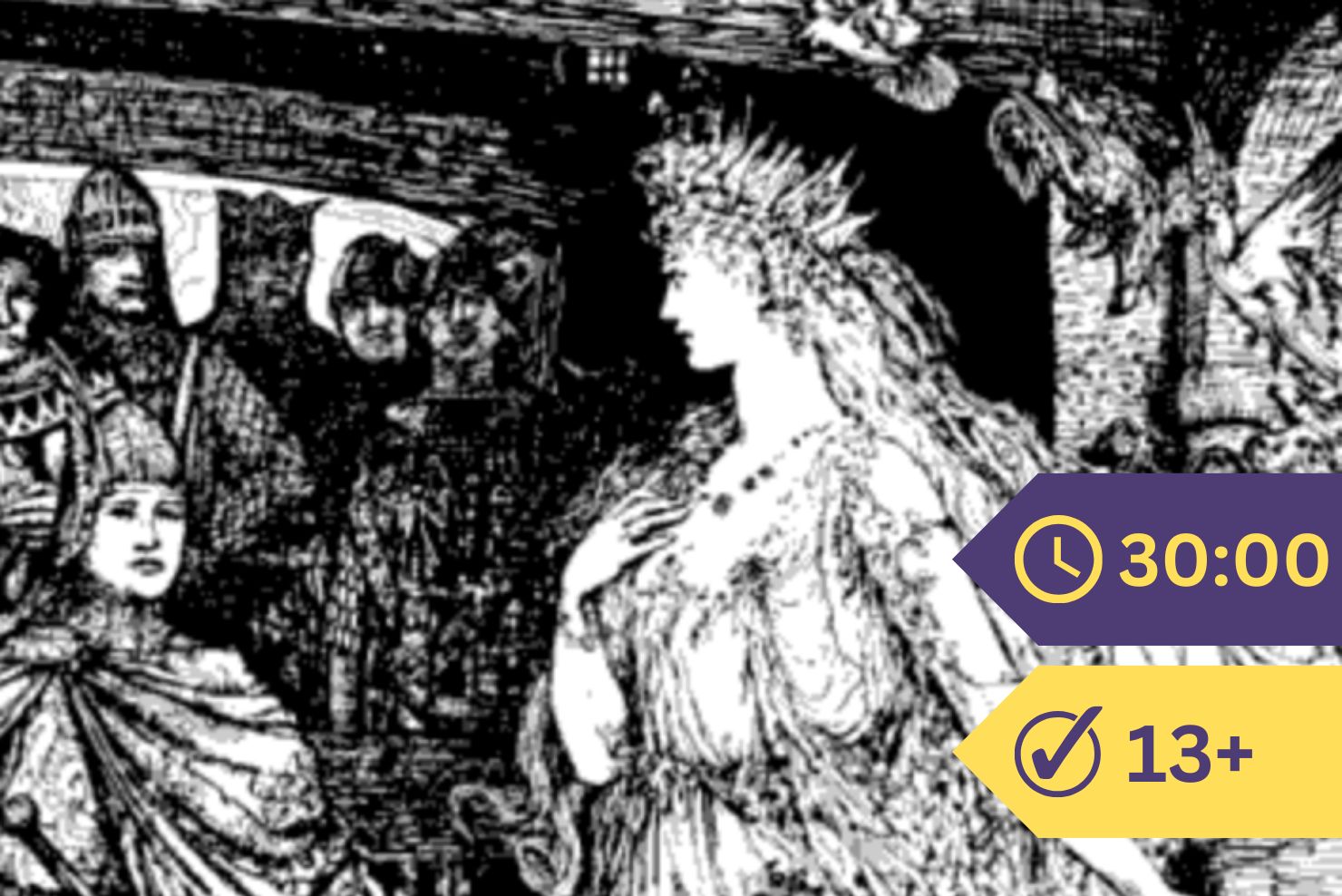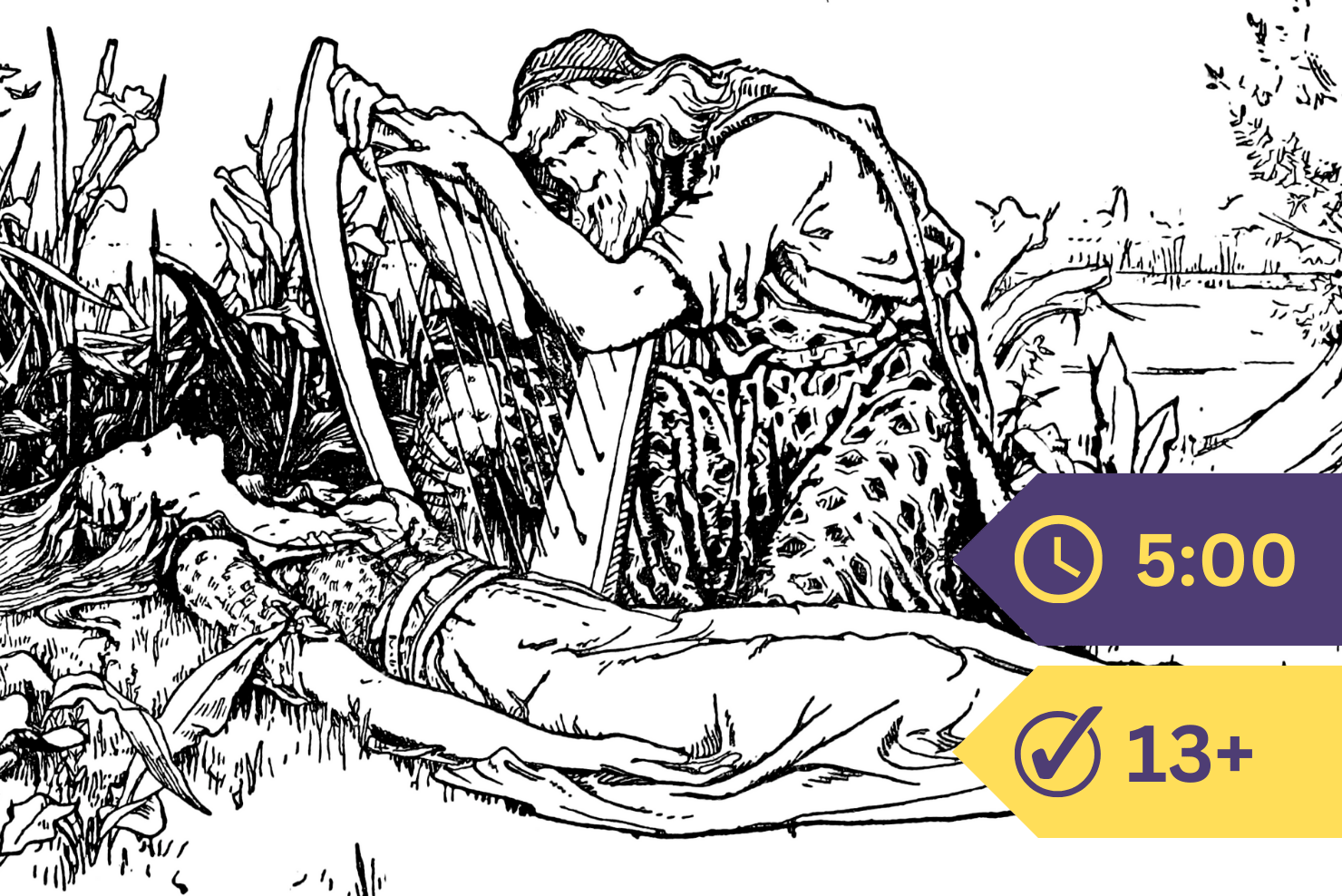Murray was King of Suddenne in the west country, a wise king whom all his subjects honoured. Godhild was his queen, and no woman of that day was lovelier than she. Their son was named Horn; and when Horn was fifteen years old, the sun shone and the rain fell on no fairer boy.
Twelve squires, each one the son of a man of noble birth, were chosen to be Horn’s companions. Athulf was the best and truest of them, and dearest to Horn’s heart; and one Fikenhild was the basest among them.
It pleased King Murry, on a certain summer’s day, to ride, as was his wont, by the seashore, with only two comrades. Suddenly, as they rode, they came upon a strange sight. There before them on the edge of the waves lay fifteen ships beached, full of fierce Saracens; and many other Saracens went busily to and fro upon the shore. “What seek you here, pagan men?” cried Murry at that sight. “What wares do you bring to this my land of Suddenne?” For he thought them to be merchants from a far land,
“We are come to slay all your folk who believe in Christ,” answered one of them; “and that we do right soon. As for you, you go not hence alive. “Thereat Murry was sorely troubled in heart. Nevertheless, he made no sign of fear. He and his two companions, with bold mien, leapt down from their horses, to fight more readily, and drew their swords, and fell upon the pagans. Many a stout blow they dealt; many a Saracen felt the strength of their arms: but for all their might and valour, they were but three against a host. From every side the enemy fell upon them unceasingly, and in a little time they lay there dead upon the sand. Then the Saracens left their ships and spread over the whole of Suddenne, slaying and burning and laying waste wheresoever they came. None might live, were he stranger or friend or native of the land, unless he forswore the Christian faith and became a pagan.
Of all women in those days Godhild the queen was saddest. Her kingdom was lost, her husband cruelly slain, and all her days were filled with grief. But worse befell her, for on a certain day the Saracens came suddenly and took Horn prisoner and carried him away. Godhild escaped, and in her dire distress fled alone to a distant cave, and there lay hid, worshipping her God in secret, and praying that He would save her son from harm.
Horn and his companions—for all his twelve squires had been captured with him—seemed in sorry case. The savage pagans were for killing all Christians. But their chief Emir wished to have no innocent blood on his hands, and spoke out boldly. “We might well slay you, Horn,” he said; “you are young and fair and strong, and will grow yet stronger. Perchance, if we spare you now, you will some day return and be avenged upon us, when you have come to your full power. Yet we ourselves will not put you to death; the guilt shall not be on us, but on the sea. To the sea will we give you and your comrades; the sea shall be your judge, to save or drown you as it will.”
Weeping and wringing their hands, Horn and his comrades were led down to the seashore. There a boat was made ready for them, with oars, but no rudder or sail.
All their tears were vain: the Saracens forced them aboard, and turned the little craft adrift into the wide ocean.
The boat drove fast and far through the water, and fear came down upon those in it. Soon they were tossing haphazard upon the rushing waves, now resting forlornly, now praying for help, now rowing wildly, as if for their lives, if ever the violence of the sea abated for a moment. All that afternoon, and through the long, dark night, they voyaged in cold and terror, till in the morning, as the day dawned, Horn looked up and saw land at a little distance. “Friends,” said he, “I have good tidings. Yonder I spy land; I hear the song of birds, and see grass growing. Be merry once more; our ship has come into safety.”
They took their oars and rowed lustily. Soon the keel touched the shore, and they sprang out eagerly on to dry land, leaving the boat empty. The waves drew the little craft gently back to themselves, and it began to glide away into the great sea. “Go now from us, dear boat,” cried Horn lovingly to it, as he saw it drawn away; “farewell, sail softly, and may no wave do you harm.”
The boat floated slowly away, and Horn wept sorely at parting from it. Then they all turned their faces inland, and left the sea behind them, and set forth to seek whatsoever fortune might bring them.






